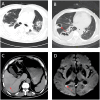Recurrent invasive liver abscess syndrome induced by Klebsiella pneumoniae with emerging drug resistance: a case report and literature review
- PMID: 40809421
- PMCID: PMC12343720
- DOI: 10.3389/fmed.2025.1605284
Recurrent invasive liver abscess syndrome induced by Klebsiella pneumoniae with emerging drug resistance: a case report and literature review
Abstract
Background: Invasive liver abscess syndrome (ILAS) caused by hypervirulent Klebsiella pneumoniae (hvKp) is a life-threatening infection associated with high mortality, particularly when complicated by brain abscesses. The emergence of carbapenem-resistant hypervirulent K. pneumoniae (CR-hvKp) during treatment, driven by emerging resistance, poses significant therapeutic challenges.
Case presentation: We describe a 70-year-old diabetic male with recurrent ILAS who developed sequential multi-organ infections, including urinary tract infection, bacteremia, lung abscess, and brain abscess. Initial isolates were identified as carbapenem-susceptible; however, under prolonged antimicrobial pressure, they were transformed into CR-hvKp carrying the KPC gene. Treatment escalated from meropenem to ceftazidime-avibactam plus tigecycline, resulting in clinical improvement and discharge after 48 days.
Conclusion: This case highlights the critical challenge of emerging resistance in hvKp during prolonged therapy, emphasizing the need for early molecular surveillance, multidisciplinary collaboration, and optimized antibiotic stewardship to mitigate treatment failure in ILAS.
Keywords: Klebsiella pneumoniae; brain abscess; case report; emerging drug resistance; invasive liver abscess syndrome.
Copyright © 2025 Li, He, Wu, Li and Wang.
Conflict of interest statement
The authors declare that the research was conducted in the absence of any commercial or financial relationships that could be construed as a potential conflict of interest.
Figures



Similar articles
-
Emergence of ST11-KL64 carbapenem-resistant hypervirulent Klebsiella Pneumoniae isolates harboring blaKPC-2 and iucA from a tertiary teaching hospital in Western China.BMC Infect Dis. 2025 Jul 1;25(1):880. doi: 10.1186/s12879-025-11241-6. BMC Infect Dis. 2025. PMID: 40596916 Free PMC article.
-
Genomic surveillance for multidrug-resistant or hypervirulent Klebsiella pneumoniae among United States bloodstream isolates.BMC Infect Dis. 2022 Jul 7;22(1):603. doi: 10.1186/s12879-022-07558-1. BMC Infect Dis. 2022. PMID: 35799130 Free PMC article.
-
Global emergence of Carbapenem-resistant Hypervirulent Klebsiella pneumoniae driven by an IncFIIK34 KPC-2 plasmid.EBioMedicine. 2025 Mar;113:105627. doi: 10.1016/j.ebiom.2025.105627. Epub 2025 Mar 1. EBioMedicine. 2025. PMID: 40024096 Free PMC article.
-
The mechanisms of resistance, epidemiological characteristics, and molecular evolution of carbapenem-resistant hypervirulent Klebsiella pneumoniae.Lab Med. 2025 Jul 11;56(4):323-335. doi: 10.1093/labmed/lmae110. Lab Med. 2025. PMID: 40072365 Review.
-
Klebsiella pneumoniae liver abscesses: pathogenesis, treatment, and ongoing challenges.Infect Immun. 2025 Aug 12;93(8):e0050824. doi: 10.1128/iai.00508-24. Epub 2025 Jul 3. Infect Immun. 2025. PMID: 40607938 Free PMC article. Review.
References
-
- Chang WN, Huang CR, Lu CH, Chien CC. Adult Klebsiella pneumoniae meningitis in Taiwan: an overview. Acta Neurol Taiwanica. (2012) 21:87–96. PMID: - PubMed
-
- He XX, Liu Y, Rao ZG, Xue XY. Updates in diagnosis and treatment of high virulent Klebsiella Pneumoniae infection. Chin J Rational Drug Use. (2024) 21:73–7. doi: 10.3969/j.issn.2096-3327.2024.11.012 - DOI
Publication types
LinkOut - more resources
Full Text Sources

